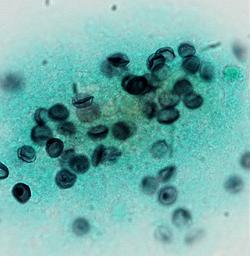
Pneumocystis jirovecii (formerly Pneumocystis carinii f. sp. hominis) is an opportunistic fungal pathogen which can cause pneumonia in patients with impaired immune systems, such as those with AIDS or who are receiving immunosuppressive drugs. It is important to accurately identify the presence of Pneumocystis in immunocompromised patients for the implementation of proper therapy. Conventional diagnosis is based on direct microscopic examination of respiratory specimens, but these methods can often be difficult to interpret. PCR allows for more definitive detection of Pneumocystis in clinical specimens.
The UWMC Molecular Diagnosis laboratory utilizes a real-time PCR protocol with fluorescent probes targeted to the Kex-1 gene to identify Pneumocystis jirovecii in clinical specimens. Pneumocystis PCR detects Pneumocystis jirovecii with higher sensitivity than the broad-range fungal PCR. The analytic sensitivity is 6 genomes per PCR reaction.